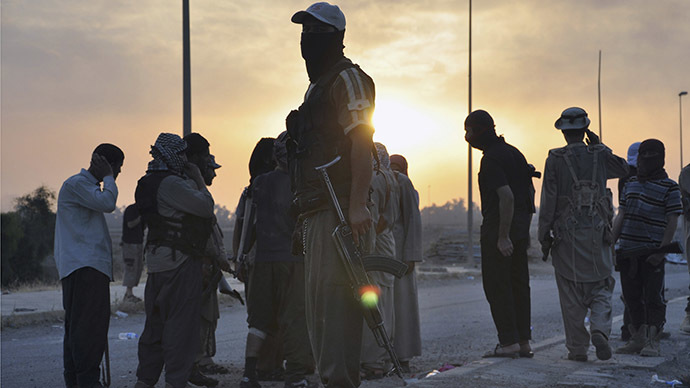‘Surge’ architects want US ground troops in Iraq to wash out ISIS

Speaking to lawmakers, retired Army officers and think tank officials who engineered the 2006 US “surge” in Iraq advocated a return of US ground troops to the region, lamenting the fall of Ramadi as a strategic setback in the war on Islamic State.
General John M. “Jack” Keane and Colonel Derek Harvey, both retired, joined Frederick Kagan of the American Enterprise Institute (AEI) and Brian Katulis of the Center for American Progress (CAP) before the Senate Armed Services committee on Thursday. Committee chairman John McCain (R-Arizona) noted that Keane and Kagan were architects of the 2007 “surge” of US forces in Iraq. Harvey helped implement the program on the ground.
“We are not only failing, we are losing this war,” said Keane, who previously served as Vice Chief of Staff of the US Army. With the fall of Ramadi, Islamic State (IS, formerly ISIS/ISIL) fighters have secured control over the Euphrates River from Baghdad to the Turkish border, he said, adding that the US’ “conceptual plan is fundamentally flawed.”
Gen Jack Keane at #SASC hearing: "We are not only failing [against #ISIL], we are in fact losing this war"
— John McCain (@SenJohnMcCain) May 21, 2015
“ISIS is on the offense, with the ability to attack at will, anyplace, anytime,” said Keane. The radical group is “expanding beyond Iraq and Syria into Sinai, Yemen, Libya and Afghanistan. They are also inspiring and motivating radical sympathizers throughout the world.”
Yet the US and its allies have “no ground force, which is the defeat mechanism. Air power will not defeat ISIS. It has not been able to deny ISIS freedom of maneuver and the ability to attack at will.”
Keane urged the lawmakers to “get past” the questions of whether the US should have gone into Iraq in 2003 or retreated in 2011. In his view, Washington ought to send material aid and advisers to Sunni tribal militias and Kurdish fighters as soon as possible, while planning to deploy US combat brigades into Iraq and Syria in the near future.
“We [have] no strategy to defeat ISIS in Syria,” he argued. “Syria is ISIS’ sanctuary. We cannot succeed in Iraq if ISIS is allowed to maintain that sanctuary in Syria.”
READ MORE: ISIS claims full control of Ramadi after Iraqi troops abandon positions (VIDEO)
Fred Kagan agreed that a US troop presence will be necessary in what he termed was a regional conflict between Saudi Arabia and Iran, fought mainly by proxies. Today the US is in a worse strategic position in the region than in 2006, Kagan said, adding that Iraqi forces are barely capable of holding the line, let alone going on the offensive against Islamic State. Retaking Ramadi will be difficult enough, and taking Mosul this year – as the Pentagon hoped to accomplish – will be impossible, Kagan argued.
“I see a coherent enemy strategy across the region,” Kagan warned, adding that Islamic State is not just a terrorist organization, but a capable military threat. He accused IS of mass murder, slavery, and mass rape, calling them “a group of unfathomable evil.”
“ISIS is one of the most evil organizations that has ever existed in the world,” he said. “We really have to reckon with that. This is not a minor annoyance. This is not a group that maybe we can negotiate with down the road someday. This is a group that is committed to the destruction of everything decent in the world.”
McCain dsn't seem happy when ret Gen Keane notes there's not much FSA left in Syria & no unit for new trainees 2join, dsn't mk sense (SASC)
— JoanneLeon (@joanneleon) May 21, 2015
Kagan urged lawmakers to repeal the sequester, significantly increase the military budget, and resist calls to dismantle surveillance and espionage programs – obliquely referring to Rand Paul’s 10-hour filibuster against the NSA on Wednesday – as those were “significant to national security.”
“We need to have 15-20,000 US troops on the ground to provide the necessary enablers, advisers and so forth,” Kagan said. “Anything less than that is simply unserious.”
Ramadi, the capital of Iraq’s al-Anbar province, fell to Islamic State fighters on Monday. Forces loyal to the Iraqi government fled the city, abandoning their US-supplied weapons and equipment. On Wednesday, IS fighters reportedly captured the ancient ruins of Palmyra, a UNESCO cultural landmark in Syria.
Originally known as the Islamic State of Iraq and Syria (ISIS), the group emerged from the chaos following the 2011 rebellion against the government of President Bashar Assad in Syria.












